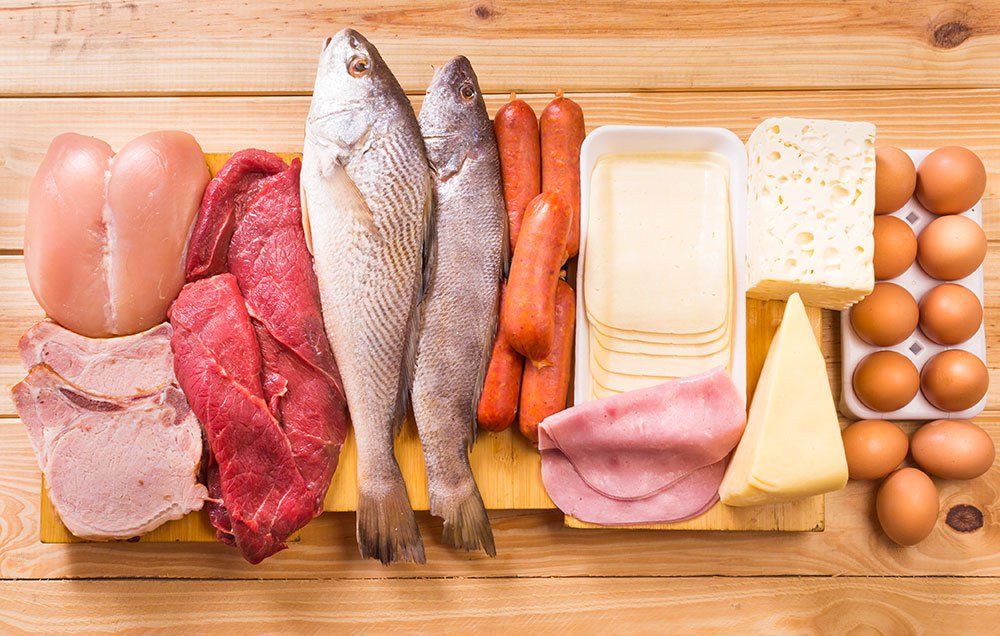A new meta-analysis shows that animal proteins are better muscle-builders than vegetable proteins.
Researchers from the National University of Singapore collected 16 previously published studies that compared the effect of animal protein supplementation on strength and muscle mass with the effect of plant protein supplementation on strength and muscle mass.
In some of the studies the subjects trained with weights, but in others they did not.
The researchers note that :
“Although animal protein is usually considered to be a more potent stimulator of muscle protein synthesis than plant protein, the effect of protein source on lean mass and muscle strength needs to be systematically reviewed.”
Before continuing with a short review of the existing research:
“The effects of animal protein vs. plant protein on muscle mass and strength have been examined in a few systematic reviews, but there are research gaps. One publication concluded that a higher amount of plant protein is needed to achieve muscle growth similar to animal protein. However, the review included trials which only studied acute changes in muscle protein turnover.
“This may not be appropriate since muscle hypertrophy is a result of long-term change in net protein balance. Furthermore, the sole focus of that review was on adults below 40 years of age. It is important to understand the impact among older adults, since a substantial decline in muscle mass and muscle strength is known to occur after the age of about 50 years. A recent meta-analysis concluded that soy protein resulted in similar muscle mass and strength gains as animal protein, but the authors did not investigate the use of other plant proteins or stratify their analyses according to age.
“In addition, both publications only reviewed studies in which subjects underwent resistance exercise training (RET). Potential differences in the effects of animal protein and plant protein among adults who do not engage in RET are therefore not known. Hence, the aim of the present systematic review and meta-analysis of randomized controlled trials (RCTs) was to compare the non-acute effects of animal protein vs. plant protein on muscle accretion and strength among adults ≥19 years, with and without RET.”
The Results
Although animal protein appears to outclass vegetable protein across the board, the differences between the effect on muscle strength were not considered statistically significant.
Nevertheless, when the researchers divided their data by age, they discovered that the difference between the effect of animal proteins on muscle mass and the effect of vegetable proteins on muscle mass was significant. There was no difference between the effect of the two types of protein on muscle mass in the over-fifties, but there was in the under-fifties.
The authors conclude that:
“…animal protein tends to have a more favorable effect on lean mass compared to plant protein, and the benefit appears more pronounced in younger adults.”
“On the other hand, protein source is not likely to have an impact on muscle strength.”
The results of the meta-analysis chime nicely with some other research we’ve drawn your attention to in recent months, particularly a 2017 study linking increased male height to the consumption of animal proteins, especially red meat, eggs and milk.
Countries involved in the 2017 height study
In that study, as well as noting that height was directly correlated with total protein intake, the researchers also noted that the countries surveyed could be divided into three different ‘nutritional styles’, each with different statures.
“The first nutritional style (in tropical Asia) is based on rice and is also characterized by a very low consumption of protein and energy. It is accompanied by very small statures between 162 and 168 cm.
The second one (in the Muslim countries of North Africa and the Near East) is based on wheat and the consumption of plant protein reaches the highest values in the world. The intake of total protein and total energy is relatively high as well and comparable with Europe, but the average height of young males is still rather short and does not exceed 174 cm.
The third one is based on animal proteins (particularly those from dairy) and is typical of Northern/Central Europe. This region is characterized by the tallest statures in the world (>180 cm), being matched only by the inhabitants of the Western Balkans, in which we can presume extraordinary genetic predispositions.”
With regard to plant-based diets, the authors conclude, unequivocally, that they “are not able to provide the optimal stimuli for physical growth, even if the intake of total protein and total energy poses no problem. In fact, we observed a difference of 10 cm (174 cm vs. 184 cm) between nations relying on the surplus of plant and animal proteins, respectively.”
The authors provide further explanation for why plant-based diets are sub-optimal:
“Besides low protein quality, a frequently forgotten limiting factor of plant-based diets is their low nutritional density, with a disproportionate load of ‘empty calories’ from starch and oils that must be consumed per unit of a key nutrient.”
The inferior protein quality of plant sources is clearly one reason why we recommend making animal-based proteins the basis of your diet.
Try our amazing dieting and nutrition Bible, Dieting Done Right, available now from our Gumroad store.We also offer Dieting Done Right as part of our Ultimate Nutrition Bundle, together with an amazing ketogenic diet primer and book of delicious recipes.












